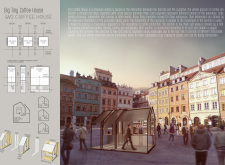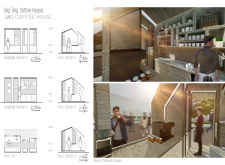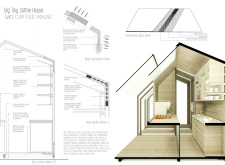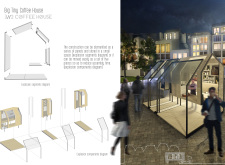5 key facts about this project
### Project Overview
The 3/2 Coffee House is situated in a town square characterized by historical architecture, aiming to create a dialogue with its surroundings while establishing a unique identity. The design focuses on the coffee production process—encompassing ordering, selection, and serving—to foster an interactive environment that enhances customer engagement.
### Spatial Configuration
The design is organized around three interconnected areas: Ordering, Choosing, and Preparation/Serving. This arrangement employs a spiral movement that facilitates a fluid transition between functions, encouraging social interaction and community involvement in the coffee-making experience. By integrating these spaces, the layout supports both individual and collective activities, allowing for versatility based on customer flow and operational requirements.
### Material Selection
Materials chosen for the 3/2 Coffee House prioritize both aesthetics and functionality. Laminated wood serves as a durable structural element, while steel components ensure integrity throughout the design. Honeycomb panels contribute to lightweight construction, and sandblasted plexiglass offers transparency, enhancing the visibility of the coffee-making process. This thoughtful selection aligns with sustainable practices and echoes architectural sensibilities found in northern European contexts, ensuring an eco-friendly approach without compromising design quality.
The structure features a low-profile, sloped roof and transparent walls, promoting an inviting atmosphere and encouraging interaction between interior and exterior spaces. The design not only facilitates operational efficiency for baristas but also engages customers throughout their experience.





















































